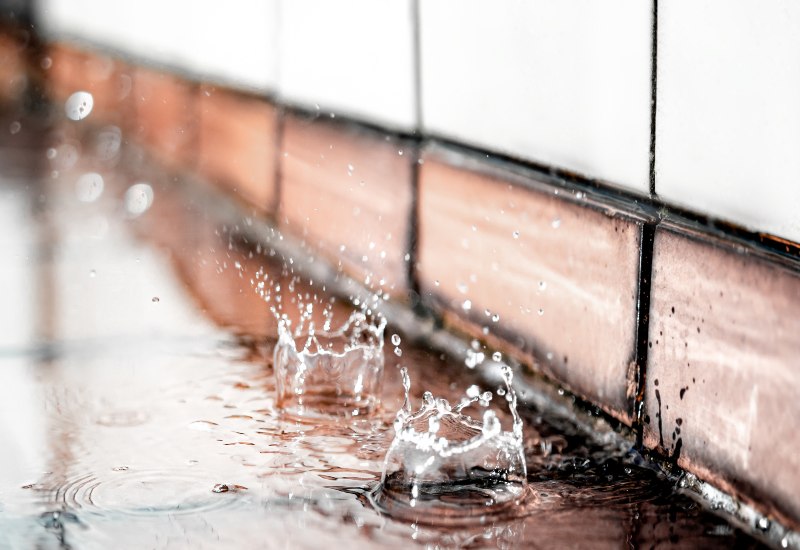
Water damage is a homeowner’s worst nightmare. It can lead to significant structural harm, ruin your personal belongings, and even threaten your family’s health if mold and mildew develop. Most water damage incidents are preventable with proper home maintenance and awareness. Learn the most common causes of water damage and practical tips to prevent it.
Causes of Water Damage
Water damage can stem from many sources, both inside and outside your home. Some of the most common culprits include:
- Plumbing leaks: A small leak from your water supply line, plumbing fixtures, or faucets may not seem like a big deal, but hidden leaks can lead to significant property damage and mold growth over time.
- Frozen and burst pipes: Pipes can freeze when exposed to subfreezing temperatures. The internal pressure caused by ice buildup may cause the pipe to burst, especially if it’s old or corroded, and the resulting water damage can be extensive.
- Clogged toilets: When solid waste clogs your toilet, the bowl may overflow with wastewater and damage the bathroom floor. If you don’t act quickly, the damage could spread to surrounding areas, causing a major health concern.
- Sewer backup: Nothing is more alarming than seeing black sewer water flow up from a sink, shower, or floor drain. This dire situation requires immediate action to avoid serious water damage and health hazards.
- Malfunctioning appliances: Washing machines, dishwashers, and water heaters can leak or overflow if not properly maintained. Brittle rubber hoses are a particularly weak link.
- Faulty air conditioner: If your AC unit’s evaporator coil freezes, it can cause water damage when the ice melts and drips onto the floor. A clogged condensate drain line can also result in an overflowing drain pan, making this another potential source of water damage.
- Clogged gutters: When the gutters along your roofline become clogged with leaves and other debris, rainwater can’t drain properly. During a heavy downpour, water may overflow and cause damage to your foundation, siding, and roof.
- Severe storms: Heavy rain can cause basement flooding, and wind and hail can damage your roof, leading to water damage and mold growth in the attic.
How to Prevent Water Damage
Preventing water damage requires you to understand the risks and take proactive measures to address them. Here are some practical tips to help you guard your home against water damage:
- Know the location of water shut-off valves: If you experience a leak, burst pipe, overflowing toilet, or other plumbing emergency, shut off the water supply as quickly as possible to minimize damage. Most fixtures and faucets have a local shut-off valve on the wall behind them. If you can’t access it, you’ll need to turn the main water shut-off valve, which is most likely near the water meter or water heater.
- Maintain your pipes and drains: Regularly inspect your pipes, faucets, and garbage disposal for signs of leaks and corrosion. Then, be careful what you put down the drain. Mesh strainers and preventative drain cleaning help keep your drains clear of debris to prevent clogs.
- Protect against frozen pipes: To prevent pipes from freezing and bursting during cold weather, install insulation on any plumbing running through unheated areas. Sealing and insulating the crawlspace, attic, or garage is also helpful if pipes run through these spaces. Also, keep your home’s temperature at 55 degrees or higher at all times, even if you leave town.
- Don’t use your toilet as a trash can: Flushing items like paper towels, baby wipes, and feminine hygiene products can cause clogs and lead to an overflowing toilet. Set a strict rule of only flushing toilet paper and human waste to keep clogs to a minimum.
- Inspect plumbing appliances and hoses: Regularly check your appliances for signs of leaks and preemptively replace any old rubber hoses with braided steel versions. Also, never leave the house while your dishwasher or washing machine is running in case they malfunction and leak.
- Avoid overworking the air conditioner: Keep your air conditioner well-maintained and avoid setting the temperature too low, as this can cause the evaporator coil to freeze. Also, check the air filter monthly and replace it when it appears dirty to prevent restricting airflow.
- Clean your gutters: Inspect the gutters and downspouts at least twice a year and clean them as needed to prevent clogs and water overflow. Also, make sure every downspout extends at least 6 feet from the foundation.
- Don’t store boxed belongings on the basement or garage floor: In case of flooding, elevate your belongings on plastic or metal shelves to protect them from water damage.
- Waterproof the basement: If you notice seepage after heavy rain, your cement floors and basement walls may require waterproof sealant. Apply this to vulnerable areas to keep your basement dry.
- Install a sump pump: A sump pump is a device installed in a pit dug into the lowest floor of your home. It removes rising groundwater so your basement doesn’t flood during periods of heavy rain.
- Improve the drainage on your property: Proper soil grading and adding a French drain can help direct water away from your home’s foundation to minimize the risk of flood damage.
Schedule Plumbing Services in the Seattle Area
Even with the best preventative measures, your home may still succumb to water damage. In the event of a plumbing emergency, don’t hesitate to contact Puget Sound Plumbing and Heating. Our team of experienced professionals is dedicated to delivering unbeatable services and keeping your home safe from water damage. Prevention is key, so our plumbing company is also well-equipped to maintain your pipes and drains to prevent water damage in its tracks. To request emergency or preventative plumbing services in the Seattle area, please call us today at (206) 938-3219 or contact us online.


